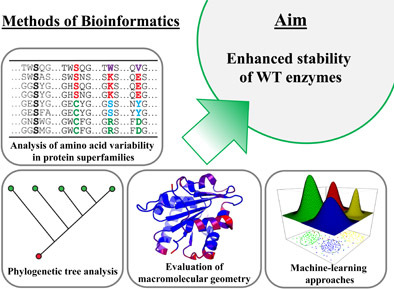EnzymoGenius™, a leader in structural bioinformatics for enzyme design, offers cutting-edge services that seamlessly integrate computational biology and structural analysis to meet the evolving needs of enzyme engineering. Our services provide a comprehensive solution for the rational design and optimization of enzymes, ensuring enhanced catalytic efficiency across various applications.
Overview
Structural bioinformatics for enzyme design is a burgeoning field that leverages computational methods to unravel the intricate relationships between protein structures and enzymatic functions. By scrutinizing the three-dimensional architecture of enzymes, researchers can discern critical catalytic sites, substrate binding pockets, and conformational dynamics, facilitating the rational design of novel enzymatic activities. Recent advances in this realm include the utilization of advanced molecular modeling techniques, such as molecular dynamics simulations and quantum mechanics calculations, to unravel the subtle intricacies governing enzymatic mechanisms. Additionally, the integration of large-scale structural databases and machine learning algorithms has accelerated the identification of key structural motifs and patterns, propelling the targeted engineering of enzymes for enhanced specificity, activity, and substrate affinity. These strides in structural bioinformatics not only deepen our understanding of enzymatic function at a molecular level but also hold immense promise for the tailored design of enzymes with applications spanning industrial biocatalysis to therapeutic drug development.
 Fig. 1 Methods of bioinformatics for enzyme design. (Suplatov D, et al., 2015)
Fig. 1 Methods of bioinformatics for enzyme design. (Suplatov D, et al., 2015)
Our Services
- Molecular Dynamics Simulations
Unravel the dynamic behavior of enzymes at the atomic level, informing the design process.
- Active Site Analysis
Identify and characterize key enzyme active sites, guiding targeted modifications for enhanced catalytic activity.
- Substrate Binding Studies
Explore enzyme-substrate interactions to optimize substrate specificity and binding affinity.
- Homology Modeling
Generate accurate three-dimensional models of enzymes for virtual screening and design.
- In Silico Mutagenesis
Predict the impact of mutations on enzyme function, aiding in the selection of optimal variants.
Key Differentiators from Other Companies
- Precision in Design
EnzymoGenius™ stands out for its meticulous approach to enzyme design, ensuring precision at the molecular level for unparalleled results.
- Integration of Structural Data
Our unique ability to integrate structural information into the design process sets us apart, providing a solid foundation for rational enzyme engineering.
- Tailored Solutions
We offer customized strategies for each project, recognizing the diverse requirements of enzyme design across industries.
Application Areas We Can Serve
EnzymoGenius™ caters to a wide range of application areas, including but not limited to:
- Pharmaceuticals
Designing enzymes for the synthesis of pharmaceutical intermediates.
- Biotechnology
Engineering enzymes for improved industrial processes.
- Biofuel Production
Optimizing enzymes for efficient biofuel synthesis.
- Agriculture
Enhancing enzymes for sustainable crop protection and improvement.
EnzymoGenius™ is at the forefront of structural bioinformatics, offering a suite of services that redefine the landscape of enzyme design. Our commitment to precision, integration of structural insights, and customized solutions positions us as a trusted partner in advancing research and industry applications. Explore the possibilities with EnzymoGenius™ and unlock the potential of rational enzyme engineering. For inquiries and collaborations, please contact us.
Reference
- Suplatov, D.; et al. Robust enzyme design: bioinformatic tools for improved protein stability. Biotechnology Journal. 2015, 10(3): 344-355.

































 Fig. 1 Methods of bioinformatics for enzyme design. (Suplatov D, et al., 2015)
Fig. 1 Methods of bioinformatics for enzyme design. (Suplatov D, et al., 2015)